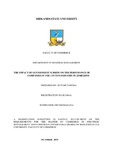Please use this identifier to cite or link to this item:
https://cris.library.msu.ac.zw//handle/11408/3882| Title: | The impact of government subsidy on the perfomance of companies in the cotton industry in Zimbabwe | Authors: | Taruba, Future | Keywords: | government subsidy perfomance of companies |
Issue Date: | Oct-2019 | Publisher: | Midlands State University | Abstract: | The study seeks to establish the impact of government subsidy on the performance of companies in the cotton industry in Zimbabwe. The Zimbabwean cotton industry had collapsed to production levels of 9 500 tonnes in year 2014 and the government of Zimbabwe intervened by subsidising cotton farmers through free Presidential inputs support scheme. The costs associated with financing cotton farming, processing it into cotton seeds and lint has proven to be very high and unsustainable to cotton companies in Zimbabwe as the prices fetched by cotton in world markets has decreased over the years and companies post losses each year despite the presence of a subsidy in the industry. The government argued that cotton production is important in reducing poverty as well being as a foreign currency earner for the country. While the government reasons are valid, the companies used as an instrument should also see their performance improve as a result of a well crafted subsidy policy. 23 participants in three cotton companies were selected from a population of 25 managers using Yamane’s formula (1967). The research data was gathered through questionnaires and interviews. A descriptive analysis approach including correlations was used by the researcher. The study revealed that the model boosted national cotton production to as high as 136 000tonnes in 2018, but the performance of companies did not respond in the same quantum. Further, the study shows that subsidising the costs associated with cotton farming was not enough, since cotton companies adopt a producer price set by government of Zimbabwe and they use their resources to pay farmers. The study recommends that the government should allow the market forces to determine producer price of cotton and should consider subsidising the producer price. The study recommends that cotton companies need to invest in reserving funds for free inputs scheme post government support, because the government subsidy in place may not be relied upon as it hinges on political will. The study shows that the free inputs support is one of the pillar that is sustaining the cotton industry at the moment. | URI: | http://hdl.handle.net/11408/3882 |
| Appears in Collections: | Master Of Commerce In Strategic Management And Corporate Governance Degree |
Files in This Item:
| File | Description | Size | Format | |
|---|---|---|---|---|
| future taruba.pdf | Full Text | 849.12 kB | Adobe PDF |  View/Open |
Page view(s)
228
checked on Feb 26, 2025
Download(s)
130
checked on Feb 26, 2025
Google ScholarTM
Check
Items in MSUIR are protected by copyright, with all rights reserved, unless otherwise indicated.


